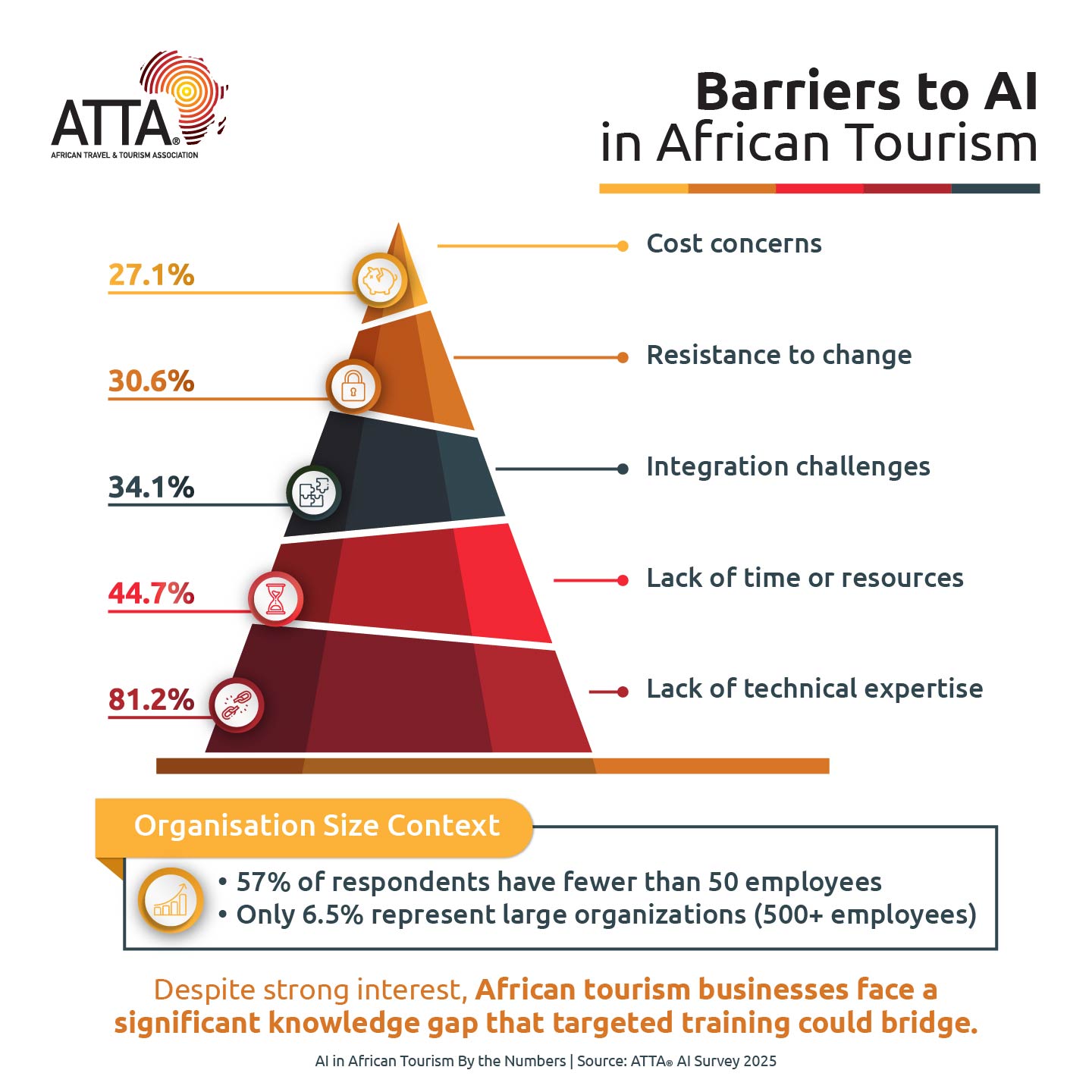
Africa's tourism shows an incredible passion for AI adoption, but important hurdles are in the way. 81.2% of survey respondents cited a lack of technical expertise as a major barrier to AI implementation.
This knowledge gap is not inherent in Africa. This is a global challenge. In regions where tourism is dominated by small and medium-sized businesses with limited resources, filling this gap requires a focused, practical approach that is not reliant solely on formal education systems and expensive consultants.
Good news? An ATTA® survey revealed that despite this challenge, tourism experts are committed to overcoming it, with 71.8% planning AI tools or training within the next 12 months. This decision, coupled with a preference for practical and practical learning, creates the foundation for strategically addressing knowledge gaps.
Understanding knowledge gaps
Before exploring solutions, it is important to understand what the AI knowledge gap actually encompasses. The findings show two different dimensions.
Technical knowledge
The first dimension includes knowing how to use AI tools, understanding prompts, configuring chatbots, and interpreting AI outputs. This is knowledge of “how” that enables daily implementation.
Strategic Understanding
The second dimension includes broader business intelligence. Know where AI can add value, identify the right use cases, understand the limitations, and integrate AI into your business strategy. This is “why and where” knowledge that guides effective implementation.
Both dimensions are important. Tourism may have the technical skills to run AI chatbots, but they do not have a strategic vision to identify the most valuable applications. Conversely, businesses with clear strategic goals can have a hard time doing technical implementation.
Learning preferences in tourism in Africa
Our research revealed clear preferences for how tourism experts want to acquire AI knowledge.
81.2% Prefers Live Webinar with Q&A Sessions 68.2% Recording Tutorial Video Live Demonstration and Evaluation Practical Examples are Very Important (84/100)
These preferences indicate a desire for interactive and practical learning rather than theoretical education. Tourism experts want to see AI tools working, ask questions, and quickly apply knowledge to real-world scenarios.
Furthermore, 91.8% of respondents are interested in travel and tourism-specific applications rather than general AI knowledge. This underscores the importance of contextualizing AI education within industry-specific use cases and scenarios.
Given the industry's learning preferences and the advantages of small and medium-sized enterprises, a self-directed approach to building AI knowledge is practical and necessary.
Here is the framework for tourism businesses to systematically address knowledge gaps:
1. Start with the affected, low complexity application
The survey revealed that 86.7% of companies using AI apply it to marketing and content creation, and that they apply it for good reason. This area has the highest immediate impact and provides the lowest barrier to entry.
Tourism businesses should identify similarly accessible entry points.
Content Creation and Translation Simple Chatbot for FAQ Social Media Content Generation Customer Review Basic Data Analysis
These applications provide immediate value while building basic knowledge that can be applied to more complex projects.
2. By doing it, you accept learning
Rather than waiting for a formal training program, tourism businesses should adopt an experiential learning approach. In our survey, 81.2% prefer interactive learning formats, emphasizing the importance of practical experiences.
This means:
Starting with a pilot project that minimizes the risk of minimizing AI champions within your organization, you can experiment and share knowledge and best practices that document the gradually expanding learning and best practices as reliability is built
3. Strategically utilize available resources
Formal education has its location, but tourism can leverage many existing resources to build knowledge.
AI follows platform experts such as podcasts and LinkedIn free or low-cost online courses that make itself a learning platform (using ChatGPT for understanding AI capabilities, for example) podcasts and LinkedIn free or low-cost online courses.
To cross tactical approaches and fill knowledge gaps, we need to cultivate a learning culture within the tourism business. Our study shows that successful AI adopters share several cultural characteristics.
Curiosity and Experiment: Leaders who encourage teams to explore, test, and even occasionally fail, create an environment where knowledge grows organically. Small experiments build group expertise over time. Sensual collaboration: AI knowledge should not be silenced within IT or marketing departments. When diverse team members (from customer service to fundraising) participate in AI tools, organizations develop a more comprehensive understanding of applications and possibilities. Continuous Study Habits: Given the rapid evolution of AI, the most successful organizations regularly establish learning rhythms with weekly AI exploration sessions, monthly knowledge sharing meetings, or dedicated times to experiment with new features. Leadership Commitment: When top management demonstrates commitment to learning and using AI, it shows importance and generates permission for teams to spend time building knowledge. Our survey showed that 46.2% of respondents are owners/CEOs/directors, indicating strong leadership interest in AI adoption.
The AI Knowledge Gap presents real challenges for the tourism business in Africa, but it is not insurmountable. By embracing a practical, self-directed approach to learning, the industry can turn this challenge into opportunities for innovation and differentiation.
You don't need to understand all the technical aspects of AI. You need sufficient knowledge to effectively apply it to specific challenges and opportunities.
A thriving business is one that considers AI knowledge as binary states.
By starting small learning, working with peers and cultivating a learning culture, African tourism can bridge knowledge gaps and position themselves at the forefront of AI-enabled tourism.
The path to advance is clear. Start where you are, use what you have and learn to go. Knowledge gaps are not barriers. This is the first step in your journey to AI-Empowed African Tourism.
If you find this interesting, click here for ATTA® resources on Generated AI during your trip. Please note this if you are only members.


